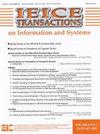基于先验信息的微表情识别分解与重构学习
IF 0.6
4区 计算机科学
Q4 COMPUTER SCIENCE, INFORMATION SYSTEMS
IEICE Transactions on Information and Systems
Pub Date : 2023-10-01
DOI:10.1587/transinf.2022edl8065
引用次数: 0
摘要
微表情识别是一种可以推断真实情绪的技术,引起了人们的广泛关注。先验信息可以有效地指导模型学习判别性特征。然而,大多数研究都集中在研究具有较强表征能力的通用模型,以整体的方式自适应地聚合MEs的运动信息,这可能忽略了MEs的先验信息和属性。为了解决这一问题,本文根据面部不同成分动作之间的关系可以推断出ME的类别这一先验信息,设计了一种符合这一先验信息的新模型,并以可解释的方式学习ME的运动特征。具体而言,本文提出了一种基于分解和重构的图表示学习(de - grl)模型,以有效地学习高级ME特征。dee - grl包括两个模块:动作分解模块(Action Decomposition Module, ADM)和关系重构模块(Relation Reconstruction Module, RRM),其中ADM学习面部关键成分的动作特征,RRM探索这些动作特征之间的关系。ADM基于人脸关键成分,将基于图模型主干提取的几何运动特征划分为若干个子特征,并学习映射矩阵将这些子特征映射为多个动作特征;然后,RRM学习权重,对所有动作特征进行加权,构建动作特征之间的关系。实验结果证明了所提模块的有效性,所提方法取得了较好的性能。本文章由计算机程序翻译,如有差异,请以英文原文为准。
Prior Information Based Decomposition and Reconstruction Learning for Micro-Expression Recognition
Micro-expression recognition (MER) draws intensive research interest as micro-expressions (MEs) can infer genuine emotions. Prior information can guide the model to learn discriminative ME features effectively. However, most works focus on researching the general models with a stronger representation ability to adaptively aggregate ME movement information in a holistic way, which may ignore the prior information and properties of MEs. To solve this issue, driven by the prior information that the category of ME can be inferred by the relationship between the actions of facial different components, this work designs a novel model that can conform to this prior information and learn ME movement features in an interpretable way. Specifically, this paper proposes a Decomposition and Reconstruction-based Graph Representation Learning (DeRe-GRL) model to efectively learn high-level ME features. DeRe-GRL includes two modules: Action Decomposition Module (ADM) and Relation Reconstruction Module (RRM), where ADM learns action features of facial key components and RRM explores the relationship between these action features. Based on facial key components, ADM divides the geometric movement features extracted by the graph model-based backbone into several sub-features, and learns the map matrix to map these sub-features into multiple action features; then, RRM learns weights to weight all action features to build the relationship between action features. The experimental results demonstrate the effectiveness of the proposed modules, and the proposed method achieves competitive performance.
求助全文
通过发布文献求助,成功后即可免费获取论文全文。
去求助
来源期刊

IEICE Transactions on Information and Systems
工程技术-计算机:软件工程
CiteScore
1.80
自引率
0.00%
发文量
238
审稿时长
5.0 months
期刊介绍:
Published by The Institute of Electronics, Information and Communication Engineers
Subject Area:
Mathematics
Physics
Biology, Life Sciences and Basic Medicine
General Medicine, Social Medicine, and Nursing Sciences
Clinical Medicine
Engineering in General
Nanosciences and Materials Sciences
Mechanical Engineering
Electrical and Electronic Engineering
Information Sciences
Economics, Business & Management
Psychology, Education.
 求助内容:
求助内容: 应助结果提醒方式:
应助结果提醒方式:


